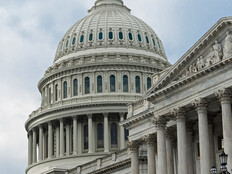Virginia Looks to Pull Ahead in Driverless Cars
By 2035, 21 million driverless cars could be on the road, according to IHS Markit. In the midst of that boom, Virginia Gov. Terry McAuliffe is pushing policy that aims to make the state the autonomous vehicle capital of the U.S.
“We are going to bury those other 49 states,” said McAuliffe in Arlington Thursday during a workshop on autonomous vehicles hosted by the Secretary of Transportation.
With autonomous vehicle leadership we are "gonna bury those other 49 states" @GovernorVA #stateIT pic.twitter.com/wEwvkyjGou
— Juliet Van Wagenen (@Juliet_Tech) March 30, 2017
Moving Legislation Toward Autonomy
The state has already enacted legislation announced in 2015 that opens more than 70 miles of interstates and arterial roads to automated-vehicle developers to test and develop these technologies. These areas, known as Virginia Automated Corridors, allow “connected-vehicle capabilities enabled by dedicated short-range communications and cellular technology [as well as] access to sophisticated, unobtrusive data acquisition systems,” according to the press release.
The state also boasts two autonomous vehicles that Virginia Tech and the Virginia Department of Transportation are currently testing, and McAuliffe says the state is open to owning its own fleet in the future.
“The technology is going to make us safer, let’s be clear. You’re not going to have people in cars driving, texting and doing everything else,” said McAuliffe, noting that nearly half of all accidents are related to excessive speed and alcohol use. “Cars aren’t stopping off and doing shots of whiskey.”
Building a Technology-Focused State
McAuliffe wants to ensure the state has a hand in pushing development in these areas forward. He touted new regulations around 5G telecommunications as a path to enabling autonomous vehicles on roads throughout the state. However, 5G wireless networks are not expected to be widely deployed until 2020 at the earliest.
“I just signed a bill the other day that we sponsor that allows us to do 5G all over our roads and with our department of transportation and other public structures now have 5G capacity. That’s great for autonomous vehicles so they can all talk to each other,” said McAuliffe.
Going forward, the governor earmarked public-private partnerships as one path to enabling greater research and development, much like Pittsburgh’s partnership with Uber, although he did not point to any companies in particular.
Moreover, McAuliffe is pushing for autonomous vehicles in all realms of transit.
“The next most exciting thing for us are not only autonomous vehicles, but I want to be the leader of drones,” said McAuliffe, touting advancements in drone technology, including delivery of the first burrito package via drone at Virginia Tech, in partnership with Google’s Project Wing. “Also because of our naval assets — largest naval base in the world — huge opportunity undersea for all of the autonomous things we do,” he added, referring to the Norfolk Naval Station.
“I want to own the land, the water and the sky,” said McAuliffe. “But I need help if we want to take it to the next level. We need to not put onerous regulations on [use of autonomous technologies]. Other states have. In fact, we haven’t put any regulations [in place], because we don’t know [what they should be] yet.”
In the state, automated-vehicle stakeholders are not required to obtain a bond, and the state will provide companies testing the technology with the necessary insurance.
Going forward, McAuliffe sees technology, including self-driving cars and sustainable energy, as a way to bring jobs into certain sectors of the state.
“These are the jobs of the 21st century,” he said.









